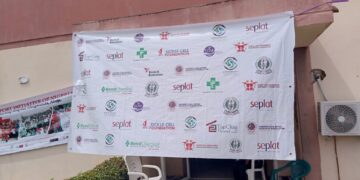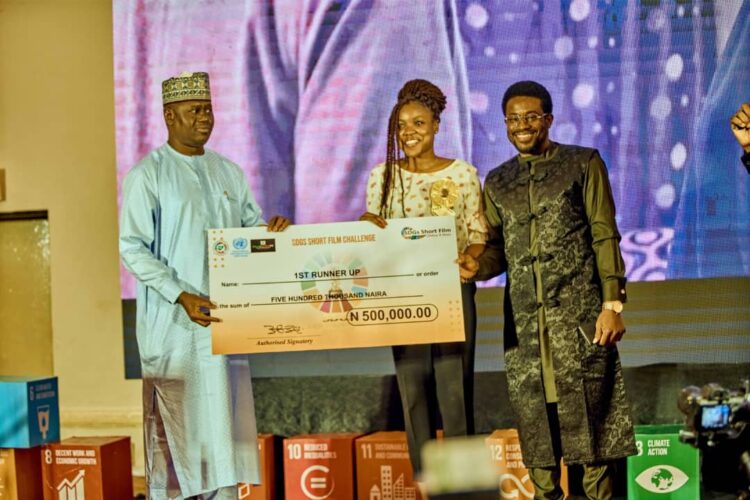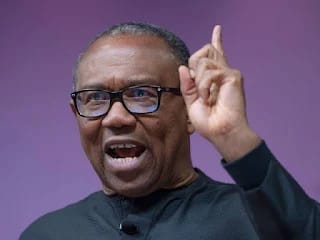
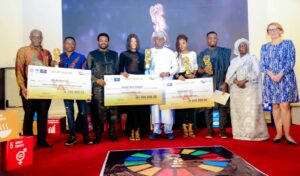



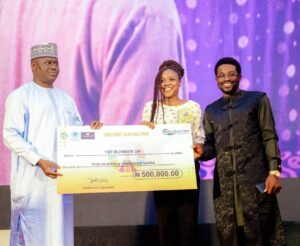
The eagerly anticipated grand finale of the inaugural Sustainable Development Goals (SDGs) Short Film Challenge & Awards unfolded on Saturday, August 12th, at the distinguished Abuja Continental Hotel (formerly Sheraton Hotel). This remarkable event was meticulously orchestrated and executed by the Office of the Senior Special Assistant to the President on Sustainable Development Goals (OSSAP-SDGs), in collaboration with esteemed partners including the United Nations Information Centre (UNIC) and FreshNEWS Multimedia. The grand finale not only lived up to its considerable hype but also presented an array of exceptional entries, each embodying the essence of the SDGs. These entries posed a formidable challenge for selection, given their precision in addressing the SDGs’ themes and messages.The distinguished attendees comprised an influential audience, including representatives from the Senate President, Godswill Obot Akpabio, the United Nations, the Bill and Melinda Gates Foundation, the US Embassy, the Presidency, the Nigerian Youth Service Corps (NYSC), the European Union, and the OSSAP-SDGs. This collective convergence attested to the event’s success in cementing itself as an all-encompassing developmental endeavor, effectively involving both the youth and the creative industry as pivotal contributors to Nigeria’s SDGs implementation efforts.Unsurprisingly, the grand finale sparked an outpouring of positive reactions that underscored the significance of this platform in championing the cause of SDGs among Nigerian youths and filmmakers. In light of this, it is essential to revisit the processes that birthed this initiative, illuminating its pivotal role as a rallying point for Nigerian youth and filmmakers within the nation’s developmental framework. This reflection delves into various aspects, including entry evaluation, winners, judging criteria, and the selection of judges.Entries and WinnersA staggering 73,000 entries were submitted for the SDGs Short Film Challenge & Awards. Through stringent screening procedures, a total of ten films were shortlisted for the final phase. These films, including Strength of a Woman, Start a Fire, Freedom Come, Water Palava, Halima, Daddy Lesson, Fatima, Wasteland, Atoke’s Child, and Tailored, exhibited exemplary qualities that aligned with the SDGs’ objectives. Following further scrutiny, three standout entries emerged victorious: “Daddy Lesson” by Alison Precious Emmanuel secured the first-place prize of One Million Naira (N1,000,000), “Halima” by Stephanie Philips clinched the second position, garnering Five Hundred Thousand Naira (N500,000), and “Tailored” by Rimamkongnde “Kongs” Yakubu Shamaki secured the third position, along with Three Hundred and Fifty Thousand Naira (N350,000).In recognition of exceptional engagement, the “Viewers’ Choice” award was conferred upon “Forever Yours,” submitted by Fred Ikpongke. This award was bestowed on the film that garnered the highest viewership and interactions on the official YouTube channel of the SDGs Short Film Challenge & Awards (@sdgsfilmchallengeandawards). While “Forever Yours” did not receive a monetary reward, it was honored with a commemorative plaque to acknowledge its noteworthy contribution.Each of the selected films, crafted by talented Nigerian youth, struck emotional chords among the viewers during the screening process. The themes ranged from environmental degradation, education, and human trafficking to water conservation, capturing various pressing concerns within the context of the SDGs.Judging Criteria and Panel SelectionThe evaluation of submissions was entrusted to a distinguished panel of judges, encompassing experts from the fields of filmmaking, sustainable development, and media. These judges meticulously assessed the films based on criteria such as creativity, impact, storytelling prowess, and, notably, their alignment with the chosen SDGs and their call to action.The selection of judges was characterized by a rigorous process, emphasizing not only their credibility within the film industry but also their grasp of the SDGs’ principles. This emphasis was justified by the event’s overarching objective: to advocate for the SDGs through diverse film genres while adhering to all 17 Goals.In a commendable display of impartiality, the judges remained oblivious to their fellow panelists until after the culmination of the evaluation process. This approach thwarted any potential biases or undue influence, bolstering the event’s credibility and integrity. Consequently, the competition’s outcome resonated with the quality, caliber, and diversity of the chosen entries.Focused Entry SelectionThe event’s organizers underscored their commitment to prioritize the selection criteria’s core focus. Beyond cinematic excellence, the paramount objective was to spotlight distinct facets of the 17 SDGs comprehensively. Consequently, the chosen entries were tasked with conveying the essence of the SDGs in a manner that galvanized a resolute call for action.Illustrating this principle, “Daddy’s Lesson” is a poignant example, intimately examining the perils of environmental degradation in Nigeria’s oil-rich Niger Delta. This film resoundingly highlights the multifaceted challenges stemming from pollution, including dire health implications, environmental hazards, and security threats. By spotlighting the pressing need for mitigative measures, “Daddy’s Lesson” masterfully evoked visceral reactions from its audience, resonating as a visceral depiction of a prevailing Nigerian reality.Similarly, “Halimah” by Stephanie Philips narrates the story of a young girl’s aspirations to pursue education, hindered by her uncle’s opposition. “Tailored,” crafted by Rimamkongnde “Kongs” Yakubu Shamaki, delves into the covert realm of human trafficking and the protracted predicaments associated with irregular migration. Conversely, “Forever Yours,” crafted by Fred Ikpongke, redirects attention to the detrimental impact on water bodies caused by human activities. In essence, these films collectively shed light on a diverse array of pressing issues within the framework of the SDGs, resonating as impactful reflections of Nigeria’s societal tapestry.The Vision and ObjectivesThe SDGs Short Film Challenge & Awards unfurls as a beacon of success in championing sustainable development awareness and action. Its objectives encompass:Raising Awareness: Filmmakers harnessed their storytelling prowess to shed light on global issues, effectively fostering awareness regarding the SDGs.Advocating Change: These films catalyzed action, inspiring viewers to partake in local initiatives and global movements aligned with the SDGs.Facilitating Dialogue: The Challenge recognized short films as catalysts for meaningful conversations on sustainable development, thereby kindling discussions about individual, communal, and governmental contributions to the SDGs.Inspiring Creativity: Filmmakers were incentivized to think innovatively, devising creative approaches to present intricate topics in relatable, engaging formats.Global Impact: These films held the potential to resonate widely, permeating diverse platforms and screenings, thereby fostering a collective stride towards realizing the SDGs.For those eager to explore the creative contributions that encapsulate the SDGs’ spirit, a selection of these shortlisted films can be viewed on the SDGs Short Film Challenge & Awards’ official YouTube channel. Further details and a firsthand experience are available on the dedicated website.In essence, the SDGs Short Film Challenge & Awards stands as a resounding testament to its potential as a galvanizing force, rallying Nigerian youth and filmmakers to unite under the banner of sustainable development. The event’s grandeur echoed in the sentiments of dignitaries, spurring calls for its expansion to sub-national levels. It has become a dynamic platform for nurturing the indispensable role of Nigerian youth in propelling national development.

